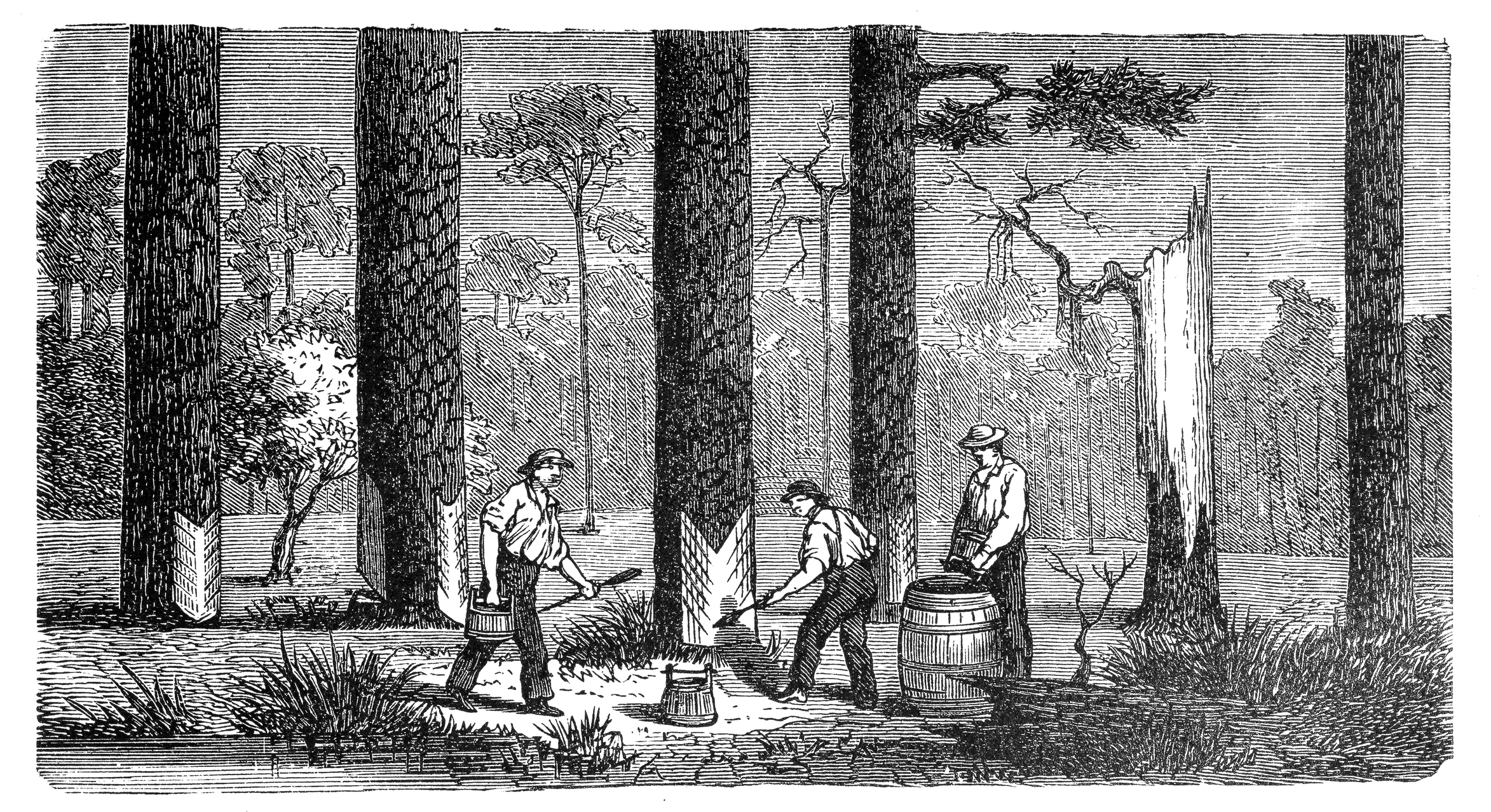The heady scent of apple cider is in the air, the foliage has begun its annual transition from life to death, and the Defector staff has once again retreated to a secret wooded location to conduct annual company meetings. In an effort to keep the blogs humming while we're sequestered, we've curated a collection of woods-themed posts for your enjoyment.
When Justin announced that we would have an "Into The Woods" theme week, my first thought was straightforward and admittedly dumb: Are we as a culture in the woods or out of the woods? Have we adequately sought to resolve the prepositional dialectic of our position relative to the woods? How (I'm sorry) liminal are we comfortable getting here? In short: Where are we vis-à-vis "the woods"?
There is only one entity positioned to answer this question. Google Trends is a record of large-scale internet search data, reaching back from the present almost 20 years to 2004. What follows is the first of many charts, the historic results of people searching for some form of "the woods." This establishes a baseline, and though there's no valence to this data, the peaks and valleys contained herein do give us a clue as to where we are going.
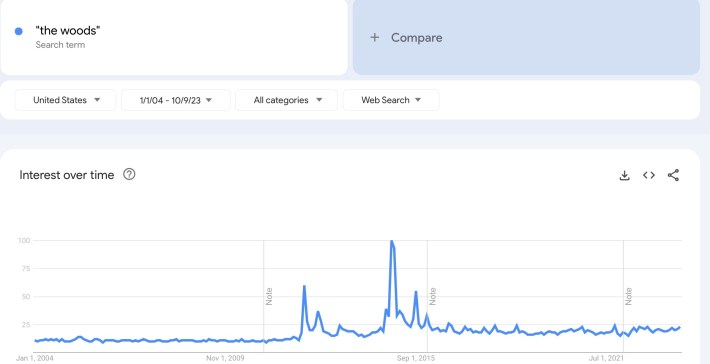
This is our baseline. Whether American culture was out of or inside of the woods at any given point along the timeline, this graph shows the ambient interest in said woods. It is undeniable: Something happened in April 2012, sparking an interest in and perhaps translocation either from or to the woods. Fittingly, it's an entry, which means up until March 2012, we were next to the woods, picnicking, or maybe chilling out like the band of Uruk-Hai taking Merry and Pippin to Isengard in The Two Towers. It is inevitable we will interact with the woods. You can see that there is a seesawing interest in the woods that never returns to pre-2013 levels after that, which means that wherever we are in relation to the woods at any given time, they form a part of the collective imaginarium.
Before we see what brought us into the woods, we should show you, respectively, the charts for "out of the woods," "into the woods," and "in the woods."
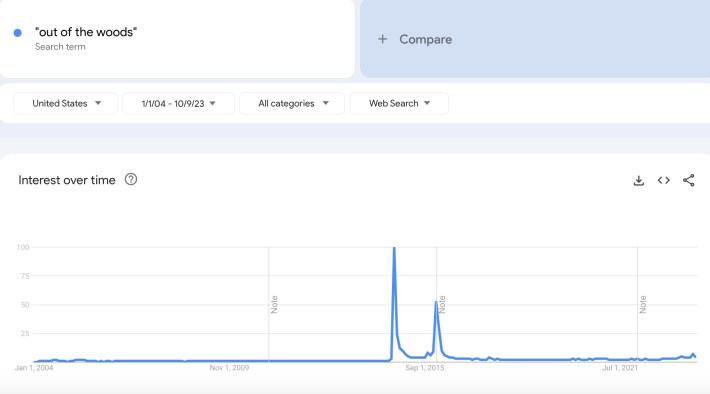
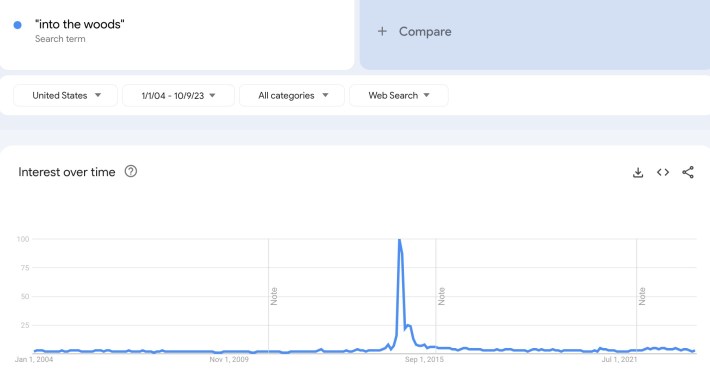
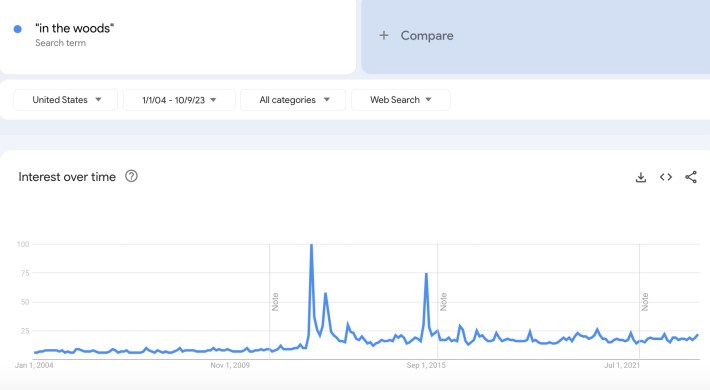
What happened in 2012 that brought us into the woods? The Joss Whedon-Chris Hemsworth meta-horror movie A Cabin In The Woods. Many found this movie about horror movies too cute by half. Others enjoyed its self-referential nature, something essential in horror, the genre most bound by, and in reverence of, its history. I watched this movie on a laptop in the architecture library in college when I should have been studying geology. Though not everyone would have the same experience with Bradley Whitford's japes and jokes, we shared one thing as a culture: We were in the woods.
Two years later, we entered the moment of conflict, which began when Taylor Swift yeeted us. "Out Of The Woods" is a song from Swift's album 1989, written from the perspective of one of a pair of people in the woods. The people in question have quite obviously been in the woods for two years, and though the song's refrain "Are we out of the woods yet?" is left unanswered in the text, the answer is yes. This means that together, we as a society, were out. But not for long! The Meryl Streep adaptation of Stephen Sondheim and James Lapine's Into The Woods dropped only months after Swift's song, dragging us back, well, into the woods. The traffic spike you see in January 2016 came after Swift released the music video, which resolved the battle, as the video ends with her leaving the woods. Resolved: We exited the woods, buffeted by bright sunshine.
Though no wave of woods interest could equal Swift's, we would not stay woodless for long. As best I can figure, the small spike in September 2016 was related to the first edition of the Dutch electronic festival Into The Woods (I don't know who any of these people are, but here's the lineup.) It was a nice summer out of the woods; maar het is tijd om terug het bos in te gaan.
In February 2018, Justin Timberlake released his fifth studio album, Man Of The Woods. The album was a pivot for him, as he eschewed the Pharrell-tinged pop sounds that propelled him to a successful post-NSYNC career to make what he called "Southern music." He hasn't released an album since, Pitchfork gave it a 3.8, and he didn't even move the cultural needle, as we remained as deep in the woods as we had been before.
And we would stay there for a long time. Netflix released the Polish show The Woods in October 2020, and though I have not watched enough to determine its position vis-à-vis the woods as a cultural locus, it seems dark. A horror movie of the same name came out the same year, which may have led to upticks of searches for "the woods" every October since then. We remain, frustratingly, in the woods. However, salvation lingers.
J.K. Simmons is set to star in the forthcoming movie You Can't Run Forever, which finished filming in 2023 after a long development cycle and might come out at some point (there's a distribution deal in the UK). Why am I bringing this up? The working title of the movie for years was The Woods. The people involved in making it quite literally got out of the The Woods business, and though we too will evacuate whenever that movie comes out, we as a culture remain, just as Defector's staff currently is, in the woods.
